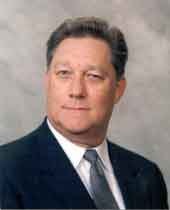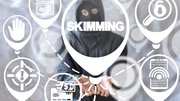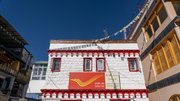News
Who's who: Ken Karant
How pre-med and a tour in Vietnam made the chief executive of Morphis Inc. the businessman he is today.
December 11, 2003
Though he decided not to pursue his original career plan of becoming a doctor, studying pre-med and serving in the Army medical corps in Vietnam helped Ken Karant become the businessman he is today.
The chief executive of software developer Morphis Inc. said that studying biology at Memphis State University taught him "how different systems all work together," whether in the human body -- or an ATM network.
Handling triage duties at a MASH hospital in Vietnam gave him the ability to make decisions based on importance. "I learned to deal with the most immediate needs first, then to tackle everything else," he said.
 |
Ken Karant |
Karant was drafted before he began his senior year of college -- because he had fallen three hours behind in his academic standing, an oversight he had planned to address by attending summer school. He trained to serve in the medical corps, and was given oversight of two 100-bed medical wards at the MASH hospital.
Though the hospital where he served was located in buildings rather than tents, Karant said in most other respects it resembled the MASH chronicled in the hit TV series of the same name. "It was amazing how accurate that show was."
After his stint in Vietnam ended in 1968, Karant was stationed at the medical center at Fort Sam Houston in Texas. He worked with burn victims, an experience he found "even more emotionally traumatic" than Vietnam.
Karant was also becoming somewhat disillusioned with the medical field. "I encountered too many physicians who were in it for the money, not to help people," he said.
Brought into banking
As half of a "starving young couple" -- Karant had married his wife Cheryl in 1966 -- he got a part-time job in mortgage banking following his 1970 move to Memphis, Tenn., where he planned to attend medical school at the University of Tennessee.
He enjoyed the business so much, he accepted when he was offered a full-time position. "It was really satisfying," he said. "Buying a house is one of the happiest points in most people's lives."
Karant took over the mortgage business of the branch where he was employed, then embarked on a 15-year career in mortgage banking, for a time running his own mortgage company -- "getting in touch with my entrepreneurial side," he said. In 1985, he moved to Dallas for a position with Lomas Mortgage USA, at the time the largest mortgage banker in the country.
A series of bad real estate investments caused the company to file for bankruptcy. Karant helped Lomas Financial Corp. navigate through the process and left in 1995 after the mortgage division was sold.
He had always been intrigued by Lomas' use of document imaging to save time and money. "Before they switched to imaging, they had one million file folders," he said. "The operational costs of pulling the folders out, putting them back and rearranging them as the business grew were tremendous."
Karant and a partner established their own service bureau, Imaged Data Incorporated. In 1997, Karant was contacted by Diebold, which was beginning to explore the idea of service bureaus. Karant spent a year in Dallas doing some consulting work for Diebold customers, then moved to Diebold headquarters in Canton, Ohio.
Business is business
Though Karant had no previous experience with ATMs, his business smarts helped him build an ROI model that could be applied to a single ATM or to a group of machines.
"If you understand the operations of any business and how it works, you can understand another," he said. "You know that the management of expense, especially fixed expense, is one of the most important aspects of any business."
Tom Cappelli, Diebold's director of outsourcing, said that Karant helped the manufacturer change its perspective on ATMs, looking at them from the host down rather than from the terminal up.
"It was frustrating at first, but it ultimately led us to a new way of selling machines," he said. "We were building the terminals, but we weren't looking at how they were connected and how they worked together. That was a piece our side needed to play."
Gary Faulkner, a former Diebold colleague who is now vice president of national accounts for Cardtronics, agreed with Cappelli.
Ken Karant |
"At the time, I think Diebold saw the ATM as an end. Ken saw it more as a means to an end," he said. "He felt ATMs could help a bank touch its customers and fulfill its branding promise."
Faulkner, whose two-year tenure at Diebold overlapped Karant's, said he remains in close touch with Karant, whom he calls "the quintessential Southern gentleman."
Karant's current position at Morphis "really sums up who Ken is and how he thinks," Faulkner said. "He's there because he believes in it. He's convinced that what they have is a better way."
Indeed, Karant's enthusiasm about the Morphis software, which automates all aspects of cash management, is obvious when he discusses the product.
"It's not just software but an analgesic -- because it offers pain relief," Karant said. "I know and understand the pain of cost control in an ATM network. One of the highest expenses for financial institutions is handling cash. For an ISO, it's a double whammy because they have to pay the cost of funds too."
Karant calls his spot "a perfect fit," noting that Morphis had never applied any concentrated efforts to marketing its software. Karant spends lots of time on the phone conducting online demonstrations and a fair amount of time traveling to see clients and prospective clients.
Leaning on faith
He grounded himself earlier this year, however, to spend more time with his wife during her battle with breast cancer. "I committed to staying by her side every moment I possibly could," Karant said.
Commitment to family is a given for Karant, who has two daughters, a son (who works for Diebold), three grandchildren and two more on the way.
"He's very much a family man," Faulkner said.
Her treatment, which included rounds of chemotherapy, was a life-altering event for Karant. "It opens your eyes to the many thousands of other people with the same problem. One in every seven women has breast cancer," he said.
Two of the couple's strongest allies, faith and family, helped them through the experience.
"The hardest times in our lives have been made easy through our faith. We've often leaned back on it," Karant said. "Everything happens for a reason. We may not know what the reason is - but it happens for a reason."
Included In This Story
Diebold Nixdorf
As a global technology leader and innovative services provider, Diebold Nixdorf delivers the solutions that enable financial institutions to improve efficiencies, protect assets and better serve consumers.
 ChatGPT
ChatGPT Grok
Grok Perplexity
Perplexity Claude
Claude












